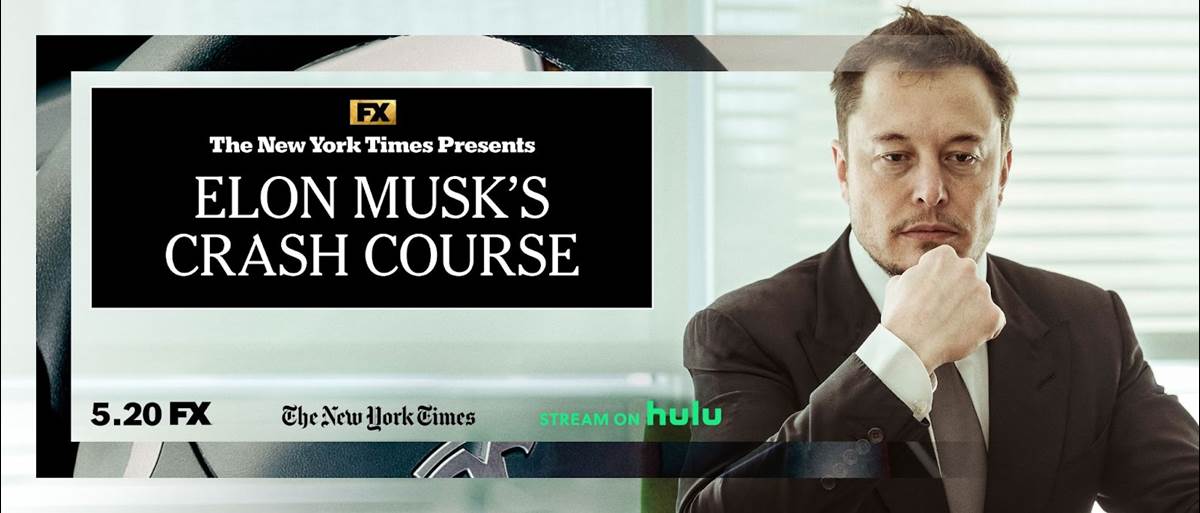TV Review: “The New York Times Presents” Raises Questions About Tesla’s Efficacy Standards in “Elon Musk’s Crash Course”
FX’s The New York Times Presents returns for its second series on May 20th with a new documentary film, titled “Elon Musk’s Crash Course." Musk has been making worldwide headlines for a multitude of reasons for over a decade, but this film specifically looks at Tesla’s autopilot feature. Narratively, it juxtaposes interviews with former Tesla insiders and autopilot testers with the 2016 death of Josh Brown. The title makes a provocative headline, although the film at times feels like it’s jumping through hoops to place all the blame on Elon Musk.

(FX/New York Times)
d
Led by The New York Times reporters Cade Metz and Neal Boudette, who appear on-camera in interviews, the documentary begins with a brief profile of the two men at the center of this story; Elon Musk and Josh Brown. It briefly goes through Musk’s upbringing in South Africa and wunderkind rise to the top in Silicon Valley, charting his path towards Tesla. For Josh Brown, it’s a showcase of a family man, veteran, adventurer, and technology enthusiast who met his untimely end at the age of 40 while driving his Tesla on autopilot.
The narrative never lets you forget about Josh Brown, revisiting his story at the end of each chapter about Tesla and Elon Musk. Brown’s friends Ken Falke, Mark Nelson, and Rob Veltre add to his narrative, as do representatives from the U.S. Department of Transportation and National Highway Traffic Safety Administration who investigated this specific accident, and several others that are briefly touched on in the film.
The most enlightening parts of the documentary come from a variety of former Tesla employees, including President of Global Sales & Service Jon McNeill (2015-2018) and a trio of engineers who worked on the autopilot feature. The case is made that Musk said too much in public speeches and interviews, giving consumers unrealistic expectations for Tesla’s autopilot features. Lacking in the narrative is an overview of the internal hierarchy or workflow at Tesla. This omission takes credibility away from the documentary’s title. It’s clear that mistakes were made at Tesla, but by the end, it feels like the filmmakers are trying to put all the blame on one person rather than telling what’s likely a more honest story about corporate greed.
The filmmakers may not have been able to get Elon Musk to sit down for an interview, nor the family of Josh Brown, but they do fill in the time with two Tesla owners who are volunteer beta testers for software releases. This is the “crash course" part of the title, the fact that Tesla owners become testers for software issues on the same roads we all share. Of the two participants, by the end of the documentary, one remains a Tesla loyalist and the other’s opinion of the company has soured. It’s as close as the film comes to trying to present a counterargument.
Odds are, you’ll look to “Elon Musk’s Crash Course" if you already have a strong opinion about the business magnate. If you already dislike him, you’ll find reasons to reinforce that emotion here. If you’re a fan, the film does little to sway you away from him with the way it stretches to blame everything on him. But as an impartial viewer, it left me with unanswered questions about how Tesla operates and what changes it needs to make to keep the trust of its millions of consumers.
I give The New York Times Presents “Elon Musk’s Crash Course" 3.5 out of 5 models released by Tesla to date.
The New York Times Presents “Elon Musk’s Crash Course" premieres Friday, May 20th at 10/9c on FX and Hulu.


